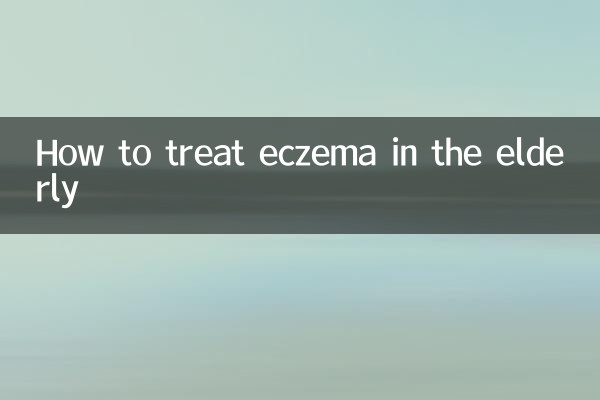How to treat eczema in the elderly
Eczema is a common skin disease. The elderly are more likely to suffer from eczema due to weakened skin barrier function and reduced immunity. Recently, the discussion on the treatment of eczema in the elderly has been very popular on the entire network. The following is a compilation of popular topics and hot content in the past 10 days, and provides you with detailed treatment plans based on structured data.
1. Common symptoms of eczema in the elderly

Eczema in the elderly mainly manifests as dry skin, itching, redness, swelling, and desquamation. In severe cases, effusion or scab may occur. Here are the detailed classifications of eczema symptoms:
| Symptom Types | Specific performance |
|---|---|
| Mild eczema | Dry skin, mild itching |
| Moderate eczema | Redness, swelling, obvious itching |
| Severe eczema | Exudate, scab, severe itching |
2. Treatment methods for eczema in the elderly
The treatment of eczema in the elderly requires comprehensive consideration of skin care, drug treatment and lifestyle adjustments. The following are the treatment plans hotly discussed across the Internet in the past 10 days:
| Treatment method | Specific measures |
|---|---|
| skin care | Use a gentle moisturizer to avoid over-cleaning |
| Drug treatment | Topical glucocorticoid ointment (such as hydrocortisone), oral antihistamines (such as loratadine) |
| Adjustment of life habits | Avoid spicy food, maintain suitable indoor humidity, and wear loose cotton clothing |
3. Prevention measures for eczema in the elderly
The key to preventing eczema is to keep your skin healthy and avoid triggers. The following are the recommended preventive measures across the network:
| Preventive measures | Specific methods |
|---|---|
| Daily moisturizing | Apply moisturizer every day, especially after bathing |
| Avoid irritation | Avoid using alkaline soap or hot water to clean |
| Diet conditioning | Drink more water to supplement vitamins A and E |
4. Things to note about eczema in the elderly
The following points should be paid attention to when treating eczema:
1.Avoid scratching: Scratching can aggravate skin damage and lead to infection.
2.Take medicine as prescribed by the doctor: Do not increase or decrease the dosage by yourself, especially hormone ointments.
3.Regular review: Timely feedback the treatment effect to the doctor and adjust the treatment plan.
5. Dietary therapy suggestions for eczema in the elderly
Diet therapy is an important means to assist in the treatment of eczema. The following are the recommended dietary therapy options across the network:
| Food Type | Recommended food |
|---|---|
| Foods rich in Omega-3 | Deep sea fish, flax seeds |
| Foods rich in vitamins | Carrots, spinach |
| Foods that clear heat and detoxify | Mung beans and winter melon |
Summarize
The treatment of eczema in the elderly requires comprehensive skin care, drug treatment and lifestyle adjustments. Through scientific treatment and preventive measures, symptoms can be effectively relieved and relapse can be reduced. If the symptoms continue to worsen, it is recommended to seek medical treatment in time to avoid delaying the condition.

check the details

check the details